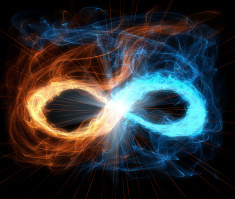Flow
There are times when doing flows into being. Like  when a toddler carefully puts the final block on a toy tower he has built. It can happen when an instrumental musician masters an intricate musical passage. Or when a runner completes her most memorable race, her leg muscles burning and lungs nearly exploding, in what is one of the best moments of her life.
when a toddler carefully puts the final block on a toy tower he has built. It can happen when an instrumental musician masters an intricate musical passage. Or when a runner completes her most memorable race, her leg muscles burning and lungs nearly exploding, in what is one of the best moments of her life.
This kind of experience is called “flow.” It can happen when someone’s mind or body is stretched to its limits in a voluntary effort to accomplish something both difficult and worthwhile.
I discovered this meaning of the word “flow” in a book called The Heart That Rocks Health Care by Barbara Young. Although it’s a spiritually-based self-help resource for nurses, it addresses familiar experiences for anyone who is in a helper role or deals with constant stress. Young’s book describes “flow” this way:
“Creativity can bring you into a state of flow, an experience of complete engagement in what you are doing and a lost sense of self, time, and space. You dissolve into the activity and the do-ing becomes be-ing, and it is intrinsically rewarding.”1
When these moments of flow happen, time disappears. Physical or mental engagement becomes a kind of “dynamic ease” that brings spontaneity and healing.
This resonates with my own experience. It’s like when I connect spiritually with a person while in conversation or in prayer. Or when I’m immersed in reading a complex story and it becomes my reality, with no line between myself and what I am reading. Or when I’m caught up in writing, following the currents of concepts and eddies of thoughts, and suddenly hours have flown by. In such experiences, there is a sense of fullness, of oneness with the Whole.
Over many years now, a Hungarian-American psychologist, Mihaly Csikszentmihalyi, has researched how people perceive such moments. He describes the result of his studies in a book called Flow:The Psychology of Optimal Experience.
Such moments of total engagement might occur when we discover:
• The body in flow – We can relish our bodies going higher, faster, or stronger than we have before in a number of sports. We may become immersed in the joy of movement, of yoga, or of sex. We might become connoisseurs of nature, of music, or of tasting a mouth-watering meal.
• The flow of thought – Wonder is the seed of knowledge, providing its own deep enjoyment. An intellectual pursuit or the flight of imagination that accompanies studying a piece of art, doing a complex dance, or playing a piece of music may bring a sense of order or of perfection. Thought can flow with the delights of science, a love of wisdom, or the challenge of lifelong learning.
• Enjoyment of relationships and of solitude – A deep friendship or a single moment of soul-to-soul connection with another person or animal may give unforgettable joy and fulfillment. Times of intentional solitude can offer a person the sense of structuring both space and time while following regular routines of spiritual disciplines or carefully caring for animals or persons.
• Assignment of meaning to our experiences – How we interpret our experiences brings order to the jumble of ideas in our mind. Flow happens when a person’s psychic energy comes together into a “life theme,” bringing a sense of harmony and authenticity in the process.
The importance of flow is not in the specific activity, but rather in concise concentration on a task that is physically or intellectually satisfying. It channels our consciousness when we are totally engaged, and gives us a sense of timelessness, peace, or satisfaction.
Despite the wide variety of activities that might prompt the experience of flow, I was excited to find there are some common characteristics:
• A balance between the challenge of the activity and one’s skills, in pursuit of a specific goal.
• Immediate feedback to one’s actions, so we know how well we are doing.
• Intense concentration, where no attention is left over to think about anything else.
• Awareness and action merge, making us fully present in the moment, aware only of what is relevant here and now.
• Self-consciousness melts away. There is no worry about failure or concern about how we appear to others.
• Hours may feel like just a few minutes, or a quick turn may stretch out for ten times as long.
• The activity becomes a reward in itself.
When we learn to have flow in our work and personal life, then nothing is wasted, and everything we do is worth doing for its own sake.
What richness and joy are possible in every moment of life! May you experience flow more and more in whatever you do.
Your partner in faith,
Betsy Schwarzentraub
1 – Barbara Young, The Heart That Rocks Health Care, (Carmichael, CA: HeartLight Press, p. 109.


